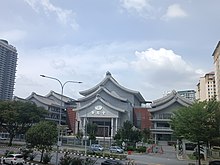Cheng Yen
[3] Unlike most of the other prominent Taiwanese Buddhist leaders, Cheng Yen was born in Taiwan rather than mainland China.
At the age of 23, her father died suddenly from brain blood vessel disorder that brought about hemorrhaging and stroke.
Upon deciding to become a nun, Cheng Yen ran away to a temple in 1960, fearing that if she were to ask for permission in advance, she might not be permitted to go.
After traveling for two years, Cheng Yen decided that she needed to become an ordained nun in order to continue her lifestyle.
In February 1963, she became the disciple of her mentor, Yin Shun, who gave her the dharma name of Cheng Yen and the courtesy name of Huìzhāng (慧璋; Pe̍h-ōe-jī: Hūi-chiong).
In May 1963, shortly after receiving her ordination as a nun, she went to Pu Ming Temple (普明寺; Pe̍h-ōe-jī: Phó͘-bêng-sī) in Hualien County to continue her spiritual formation.
The Innumerable Meanings Sutra addresses human problems, weather behavior, and psychiatric, psychological, and spiritual issues.
[17] The second event was a now-famous discussion Cheng Yen had with three Roman Catholic nuns at Pu Ming temple in 1966.
While the nuns admitted the profundity of Buddhist teachings, they noted that the Catholic Church had helped people around the world by building schools and hospitals and inquired, "But what has Buddhism done for society?".
The discussion is credited with having made Cheng Yen realize that Buddhism had to do more than simply encourage the private cultivation of people's souls.
[3][18] Influenced by the Lotus Sutra, and the encounters with the Taiwanese aborigine woman and the Roman Catholic nuns, Cheng Yen established the Buddhist Compassion Relief Tzu Chi Foundation on 14 May 1966[19] in an endeavor to help the poor of east Taiwan.
However, with the surge in popularity of Humanistic Buddhism in Taiwan in the late 1980s and 1990s, Tzu Chi enjoyed a rapid expansion in membership alongside several other major Taiwanese Buddhist organizations.
[25] One of the most iconic attributes of Tzu Chi disaster relief efforts is that volunteers not only provide short term aid but also partake in long-term projects to rebuild the communities affected.
Tzu Chi often builds new homes, schools, hospitals, and places of worship (including churches and mosques for non-Buddhists) for victims following a disaster.
[27] A significant fraction of funds raised by Tzu Chi revolves around environmentally friendly goals such as the encouragement of recycling and using reusable items to reduce waste.
Da Ai features non-political news, lectures from Cheng Yen, and serial programs focused on the virtues, often profiling people who made major changes in their life for the better.


